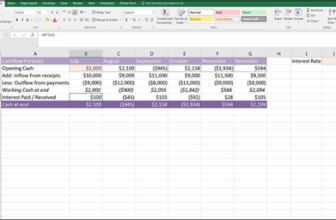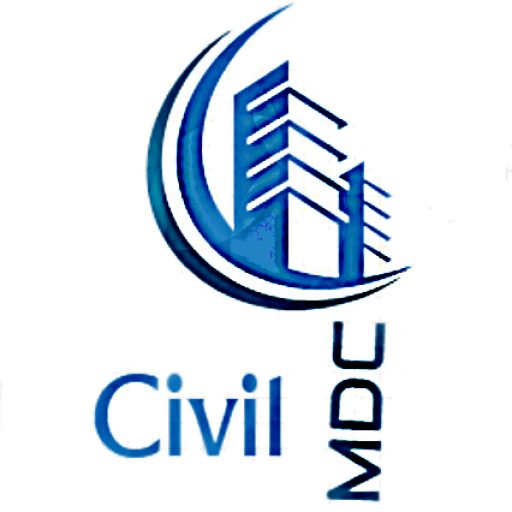DRAWING INSTRUMENTS
In selecting instruments for drawing, secure the best you can afford. With
reasonable care a set of good instruments will last a life-time, whereas poor ones will
cause disturbance even the start and will be unusable after a very short period.
Drawing Board
The drawing surface may be the drafting table top itself or a separate board.
Drawing board is a rectangular wooden piece with two short and two long sides
about 2.75′ x 2′ size. One short edge is especially made straight and is called the
working edge. This edge should be tested with an already tested T-square blade and
must be perfectly straight.
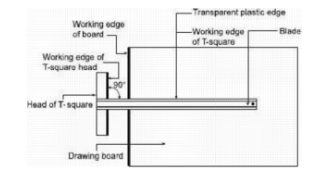
Fig 1.1 Drawing board and T-square
T-Square
The T-square is composed of a long strip, called the blade, fastened rigidly at right
angle to a shorter piece, called the head or stock. The upper edge of the blade and the
inner edge of the head are working edges and must be straight. Transparent edge is
recommended for top edge the blade since it permits the working person to see drawing
underneath. T-square may be made up of wood,
plywood ; or plastic but its size must be equal to the board size (called imperial size).
Drawing Sheet
Imperial size (30" x 22") sheet of better quality should be used. In general, paper
should have sufficient grains or teeth against which lead of the pencil may work,
colour of the paper should be agreeable to the eye, the sheet should provide a hard
surface not easily grooved by the pencil and erasing qualities of the paper should be
good. Drawing on a good quality sheet is always easier.
Drafting Tape (Scotch Tape)
It is a colourless sticking tape which is used to fix the sheet on the drawing board. Triangles Or Set -Square
Two triangles are used in drawing. For the first triangle, angles are 45°, 45° and 90°
and is called 45° triangle. The other triangle has 30°, 60° and 90° and is called 30°-60°
triangle. 45°-triangle should be about 10 in. (25 cm) in size, whereas, longer side of
30°60 ° triangle should be about 14 in. (35 cm). At least one side of each triangle
must be graduated in inches or centimetres depending upon the units to be used for
the drawing work. These triangles are made of transparent plastic material.
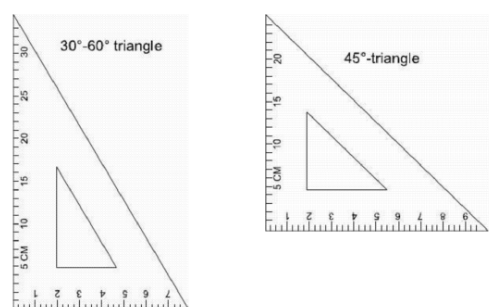
Fig 1.2 45° and 30°-60° Triangle
Diagonal Scale
It is a 6 inches long flexible scale which is basically used for measuring very small
dimensions with reasonable accuracy but, in general, it is a multipurpose scale. With
decimal diagonal scale in inch units, measurements may be taken up to second
decimal place.

Fig 1.3 Decimal Diagonal Scale
Compasses And Dividers
Compass is an instrument with the help of which we can draw circles; it consists of two
arms hinged together at one end. One of the arms holds a metallic needle at the free
end while the other arm may hold another needle, lead, pen, or a lengthening bar.
Bow-type compass with opening and closing screw in-between the two arms is
preferable because the compass may be opened exactly and further the opening is not
disturbed while drawing the circle. If both arms and into needle points, the
instrument is called a divider. At least two compasses,
one small and one large, and one divider should be obtained with all the accessories like
extra leads, extra needles, lengthening bar, and small screw-tightner. The set of
compasses and dividers is commonly available in the form of a drawing instrument
box.
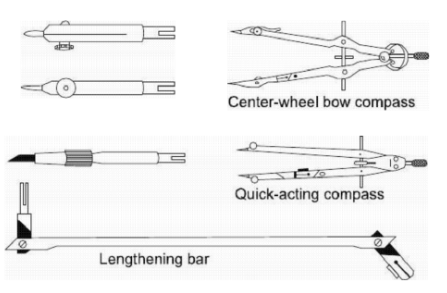
Fig 1.4 A set of drawing compasses and dividers
Pencils
The basic instrument for drawing is the graphite lead pencil made
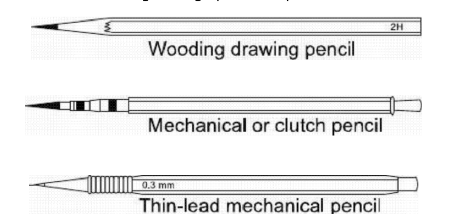
Fig 1.5 Types of Pencils
in various hardnesses. Hardness of the pencil is specified by its grade, 9H to 7B.
– – – – – – – – 3H, 2H , H , HB and F , B, 2B – – – – – – – – –
Hardness increases Softness increases
For ordinary building drawing, 4H, H, HB, and B pencils are only required.
1.2.9. Small Knife And Sandpaper Pad
Sandpaper pad is a small wooden strip pasted with a sandpaper on one side and a
small foam on the other end. Sandpaper is used to make required shape of the lead and
foam is used for final cleaning of the same.
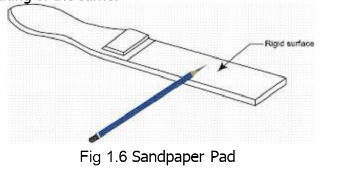
Fig 1.6 Sandpaper Pad
Eraser
Eraser is used to rub out extra and incorrect lines. It should be of suitable grade and of
good quality.
Erasing Shield
It is a thin metallic various plates with perforations shapes of extra completion and is
used to remove of a drawing without disturbing required lines.
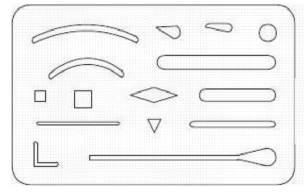
Fig. 1.7 Erasing shield
Towel Or Brush
During drawing work, frequent cleaning of the sheet and instruments is needed.
Hence, a towel or brush should always be available.
Triangular Scale
This instrument is triangular in shape having six edges and usually two scales are
provided over each edge, one starting from the left and the other starting from the right.
The scales (in F.P.S. units) available in triangular shape are generally of three types:
a) Mechanical Engineer's Scale
These scales are used to draw the object on the actual size, double size, half size, quarter
size, or eighth size.
As usually smaller dimensions are involved in machine drawing, bigger divisions represent
inches which are then subdivided in fractions.
b) Civil Engineer's Scale
This scale is graduated in the decimal system and the set of these scales is as follows: 10, 20, 30,
40 – – – – – –
On a 10-scale, inch is divided into 10 equal parts, one part is generally considered to be equal
to 1 foot in survey maps. In other words, 10 ft of the actual structure will be shown by 1 inch
of the line on the drawing sheet.
Mechanical Engineer's and Civil Engineer's Scales are not used for the building drawing.
c) Architectural Scale
Full, Half, Quarter, Eighth – – – – – – – or 1,
1/2, 1/4, 1/8, – – – – – – –
Architectural scale is actually an inch-foot scale and Full scale here means that one foot of
the structure is represented by one inch of the drawing line; size is reduced 12 times before
drawing.
Similarly half scale means that one foot of the structure is represented by half inch of the
drawing line, reduction factor being 24.
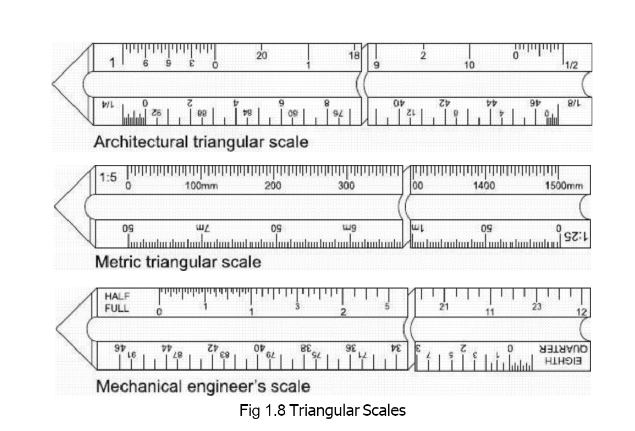
Fig 1.8 Triangular Scales
Architectural triangular scale should be obtained for building drawing.
Set Of Circles (Circle Template)
This is a thin sheet of plastic having circular openings of various sizes and is
especially useful to draw circles of very small radii. It may also be used to draw curves
tangent to other circles or straight lines.
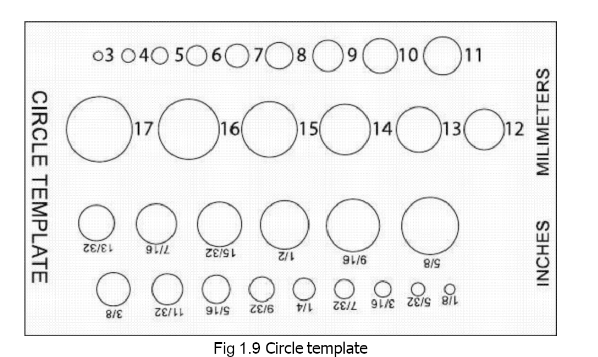
Fig 1.9 Circle template
French Curves
These are made of plastic sheets with edges lying in irregular curves. Suitable
curves may be fitted for the already plotted points and freehand curves may be
changed into smooth curves.
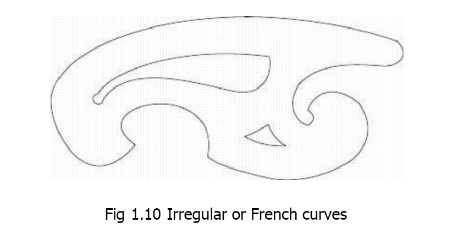
Fig 1.10 Irregular or French curves
Flexi-Rod
It serves nearly the same purpose as the French curves do. First the flexi-rod is
shaped according to the required curvature, it then retains its shape and is used to
draw smooth curves.





